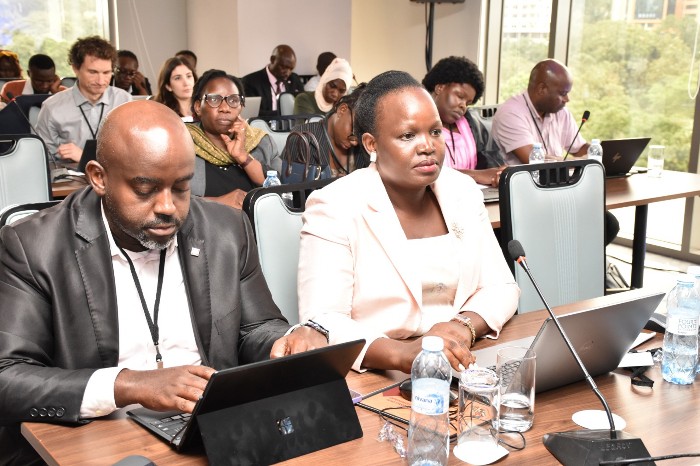
In their recently issued annual report, the standards body say that up to 4,886 Q marks were issued in FY2022/23, compared to 4,225 permits that were issued in FY2021/22.
“This represents a percentage increase of 15.6%,” reads the UNBS annual report for 2022/23, adding that it received 6,301 applications for the Q mark in FY 2022/23 as compared to 5,696 in FY2021/2022, representing 10.6% rise in product certification requests.
“We are making a significant positive contribution to the growth of the Ugandan economy through increased application of standards in industry,” further reads the report.
It further says that an increase in application of standards has led to a rise in export of locally manufactured products within the region, coupled with increase in imports substitution.
“The Q-Mark provides consumers with assurance that products meet standard requirements and are safe and fit for purpose. This has improved confidence in the local manufacturing sector,” further says the standards body.
The top ten certified products in the FY 2022/23 included; maize flour, bread, non-carbonated soft drink, Kombucha drink, gin, packaged drinking water, alcoholic fermented beverage, roasted coffee beans, food grain snack and flat and carrier plastic bags.
Application from maize flour manufacturers topped the list with 403 requests for the Q mark, followed by bread, which numbered 195. UNBS received 113 applications from manufacturers of non-carbonated soft drinks, 89 from Kombucha drinks producers, as well as 86 from gin manufacturers.
It further got 70 applications from packaged drinking water, 63 from alcoholic fermented beverage manufacturers, 61 applications from roasted coffee beans manufacturers, 56 from food grain snack producers, and 48 applications for Q marks from flat and carrier plastic bags.
PRODUCT AUDIT
UNBS further revealed that 8,222 product certification audits were conducted in FY2022/2023 as compared to 6713 that were done in FY2021/2022, representing 22.5% increase.
“About 9,217 products were sampled from the industry and market for independent testing as part of product evaluation. This represents a 18.8% increase from 7,758 products sampled in FY2021/2022,” further reads the report, adding that the performance for the FY2022/23 showed improvement in performance of the audit function.
SHS140M REVENUE
UNBS was also able to raise a Non Tax Revenue (NTR) of sh140m from sales of standards.
“A total of 4,234 standards were sold which resulted in a substantial revenue stream. In the period under review, 559 Final Draft Uganda Standards (FDUS) were prepared and edited, ready for approval by the National Standards Council (NSC),” further reads the report, adding that of these, 389 were presented and approved by the aforementioned council.
The current stock of Uganda Standards indicating origin as of June 2022 stands at 4,730 up from 4,548 the previous year
UNBS was able to sell a total of up to 4,234 standards, which included 794 in the chemicals and consumer products sub sector, 2,886 in the food, agriculture, and forestry sub sector, 450 standards in the engineering and construction sector, as well as 104 in the services and business management sub sector.
ISO sponsored a study on “Economic Impact of standards on Ugandan economy” which was completed by the consultant and a high-level presentation was made to UNBS together with a team from ISO. This study utilized a new ISO methodology and was piloted in Uganda and Senegal (Africa); Indonesia, Jamaica and Brazil.
“The findings indicated that standardization is associated with 23.7% GDP growth in Uganda from 2001 to 2019. Also that between 2001 and 2019, an increase of 1% in the stock of standards is associated with a 0.096% increase in labour productivity.”
The current stock of Uganda standards indicating origin as of June 2022 stands at 4,730 up from 4,548 the previous year.
MSME’S SUPPORTED
UNBS further reported that it supported the Micro Small and Medium Enterprises (MSMEs) with services such as gap analysis, tailored guiding workshops, onsite technical guidance, product development and testing, and certification of products/services.
“The certification function has continued to provide support for MSMEs to create awareness and provide specific guidance to implement and meet the requirements of standards to achieve certification. This has been especially important with the rollout of the implementation of the use of Distinctive Mark Regulations, 2018.”
UNBS said that 281 MSMEs were visited for on-site technical assistance and gap analysis (compared to 87 MSMEs in FY2021/2022), “While 258 MSMEs visited UNBS and were provided with technical advisory services (compared to 271 MSMEs in FY2021/22),” further reads the report.
It said that during FY2022/23, UNBS issued certification permits to 1114 products manufactured by MSMEs as compared to 639 permits issued in FY 2021/22 indicating 74.3% increase.




